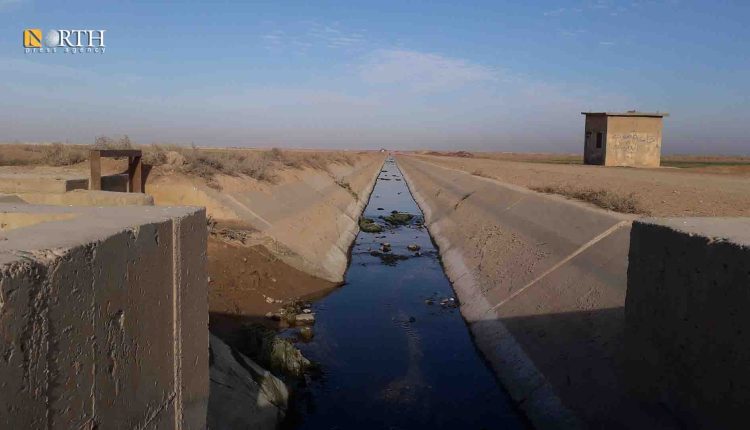AANES applies rationing system for irrigation in Syria’s Raqqa
RAQQA, Syria (North Press) – An official in the Autonomous Administration of North and East Syria (AANES) said on Sunday that they are implementing strict rationing of irrigation for the winter season due to a water shortage in the Assad Lake.
Muhammad Ali, co-chair of the Irrigation Office in the Agriculture Committee of Raqqa’s Civil Council, explained that due to the water shortage in the Euphrates’ reservoir, they managed to draw only 45 cubic meters of water for the current winter season.
Since the construction of the Euphrates Dam, the Lake has reached its lowest water level in the summer of 2023 due to Turkey’s continued limitation of water from the Euphrates River since February 2020.
Ali pointed out that they are implementing strict rationing and following a rotation method to supply water to the irrigation channels, known as al-Adan.
Al-Adan is an irrigation method followed by the Operation Department of the Irrigation Office. It involves dividing the channels or a single channel into sections and alternatively supplying water to each section for specific days.
The official said that rainfall has partially compensated some of the water shortage from the dam.
In a related context, Ali revealed that in 2023, they repaired 370 sites in 170 irrigation channels in Raqqa. They also isolated drainage and irrigation channels spanning 275 km.
He added that they are planning to isolate agricultural drainage channels in the villages of Mazra’at al-Assadiya and Mazra’at al-Yarmouk in the north of Raqqa.
Raqqa currently has 25 pumping stations, comprising 102 pumping units. However, nine units are currently out of service and require a substantial budget for repair. The Irrigation Office’s budget alone is insufficient, necessitating support from organizations, according to Ali.
Ali said they recorded 1,165 violations and encroachments on irrigation channels, which include instances of breaking locks, tampering with channels, and illegal water extraction.
He added they face many challenges, including non-compliance by farmers with the agricultural plan, a lack of necessary expertise, inadequate investment, operational budgets, and a shortage of fuel.

